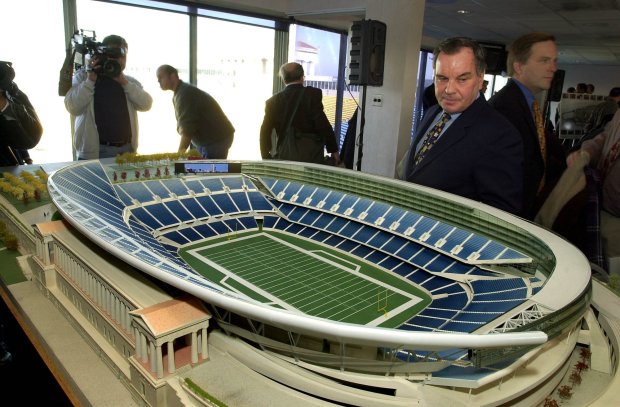Former Gov. Pat Quinn revisited a quarter-century old defeat Wednesday, filing legislation with the Chicago city clerk’s office that, if passed, would ask city voters in November whether the city should “provide any taxpayer subsidies” to the Chicago Bears or Chicago White Sox to build a new stadium or real estate development.
If passed, the referendum would be nonbinding, so its function would serve only as a barometer of voter sentiment. Nor at the moment does it have a shepherd in the City Council, which is necessary for it to go anywhere. Quinn said he has not yet spoken with any aldermen or Mayor Brandon Johnson about the referendum ordinance to get the language on ballots when voters will head to the polls for the presidential election.
Even so, Quinn told reporters at a news conference that other major cities such as San Francisco, Seattle and Minneapolis have held referendum votes for publicly financed stadiums, so Chicagoans should have their say, too. Both teams’ current stadiums were funded by the Illinois Sports Facilities Authority, a government entity that issued municipal bonds backed by a 2% hotel tax. Both teams are reportedly seeking an extension of that tax at the state level and potentially additional taxpayer funds in Chicago to each move to new stadiums downtown. The Bears earlier this month also said they were prepared to provide $2 billion in private funding for a new publicly owned enclosed stadium and park space in the city.
Both teams face headwinds. Gov. J.B. Pritzker has said he generally opposes subsidizing private companies beyond helping with general infrastructure costs, and state Senate President Don Harmon suggested the two teams work on a single bill. Johnson has seemed more receptive to stadium subsidies if teams provide “meaningful private investment” and provide a “public benefit.”
“I think the people of Chicago are sports fans, big-time sports fans, but we’re also fans of the taxpayer. We’ve got to make sure that everyday people who are living from paycheck to paycheck get a fair shake,” Quinn said, noting that he was defeated in a prior attempt to bring a referendum related to Soldier Field’s last major renovation and, as governor, he rebuffed calls from the the Chicago Cubs for taxpayer help on Wrigley Field renovations.
The referendum question would ask voters: “Shall the people of Chicago provide any taxpayer subsidies to the Chicago Bears or Chicago White Sox in order to build a new stadium or real estate development?”
Before his days as governor, Quinn was a citizen activist frequently pushing for referenda and getting attention for proposing ideas that looked good on a ballot but had no real effect. He has twice pushed the referendum idea of banning naming rights for Soldier Field, neither of which got off the ground. Nor did his plan to get a binding referendum on the 2023 Chicago ballot imposing a two-term limit on Chicago mayors.
Wednesday’s proposal mirrors Quinn’s move in December 2000 when then-Mayor Richard M. Daley was helping usher along taxpayer help for the “spaceship” renovation of Soldier Field. Quinn at the time delivered a petition calling for a binding referendum on the stadium plan. It was blocked in courts and a bond issuance for renovations went forward.
“23 years later, Illinois and Chicago taxpayers remain on the hook” for hundreds of millions of dollars in debt to pay back borrowing related to that renovation, a news release from Quinn noted. He told reporters the city shouldn’t make the same mistake twice.
The mayor’s office did not immediately respond to a request for comment on Quinn’s plea. The former governor told reporters he’ll work to build support before the April City Council meeting, when the clerk will formally introduce the ordinance and refer it to committee.
“The longest journey begins with step one, I get to file the petition today. Then you build the majority. When I was governor, there were a lot of important bills. It took a little bit of time to build enough legislative support to pass it into a bill that I could sign into law,” Quinn said.



